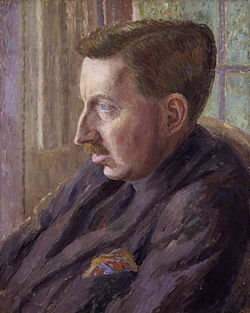E.M. Forster Quote
It so happened that Lucy, who found daily life rather chaotic, entered a more solid world when she opened the piano. She was then no longer either deferential or patronizing; no longer either a rebel or a slave. The kingdom of music is not the kingdom of this world; it will accept those whom breeding and intellect and culture have alike rejected. The commonplace person begins to play, and shoots into the empyrean without effort, whilst we look up, marvelling how he has escaped us, and thinking how we could worship him and love him, would he but translate his visions into human words, and his experiences into human actions. Perhaps he cannot; certainly he does not, or does so very seldom. Lucy had done so never.
It so happened that Lucy, who found daily life rather chaotic, entered a more solid world when she opened the piano. She was then no longer either deferential or patronizing; no longer either a rebel or a slave. The kingdom of music is not the kingdom of this world; it will accept those whom breeding and intellect and culture have alike rejected. The commonplace person begins to play, and shoots into the empyrean without effort, whilst we look up, marvelling how he has escaped us, and thinking how we could worship him and love him, would he but translate his visions into human words, and his experiences into human actions. Perhaps he cannot; certainly he does not, or does so very seldom. Lucy had done so never.
Related Quotes
About E.M. Forster
Considered one of the most successful of the Edwardian era English novelists, he was nominated for the Nobel Prize in Literature in 22 separate years. He declined a knighthood in 1949, though he received the Order of Merit upon his 90th birthday. Forster was made a Member of the Order of the Companions of Honour in 1953, and in 1961 he was one of the first five authors named as a Companion of Literature by the Royal Society of Literature.
After attending Tonbridge School, Forster studied history and classics at King's College, Cambridge, where he met fellow future writers such as Lytton Strachey and Leonard Woolf. He then travelled throughout Europe before publishing his first novel, Where Angels Fear to Tread, in 1905. The last of his novels to be published, Maurice, is a tale of homosexual love in early 20th-century England. While completed in 1914, the novel was not published until 1971, the year after his death.
Many of his novels were posthumously adapted for cinema, including Merchant Ivory Productions of A Room with a View (1985), Maurice (1987) and Howards End (1992), critically acclaimed period dramas which featured lavish sets and esteemed British actors, including Helena Bonham Carter, Daniel Day-Lewis, Hugh Grant, Anthony Hopkins and Emma Thompson. Director David Lean filmed another well-received adaptation, A Passage to India, in 1984.
